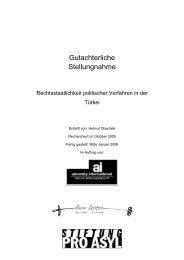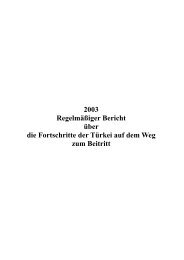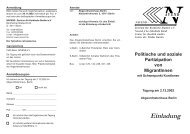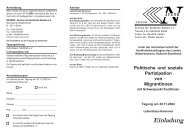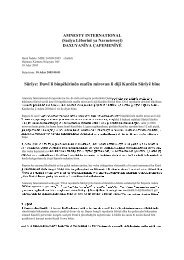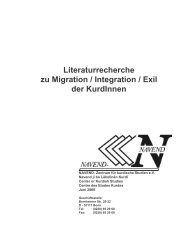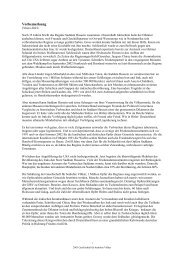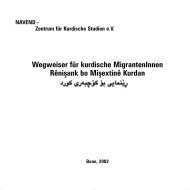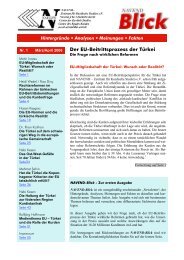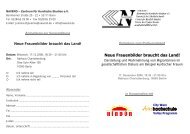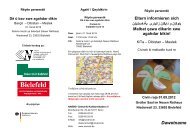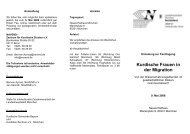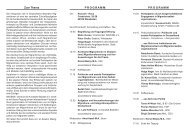Responsibility to protect the Kurds - Navend
Responsibility to protect the Kurds - Navend
Responsibility to protect the Kurds - Navend
Create successful ePaper yourself
Turn your PDF publications into a flip-book with our unique Google optimized e-Paper software.
<strong>Responsibility</strong> <strong>to</strong> <strong>protect</strong> <strong>the</strong> <strong>Kurds</strong><br />
March 2003<br />
governments and humanitarian agencies<br />
should do all <strong>the</strong>y can <strong>to</strong> prevent Turkey<br />
from deploying <strong>the</strong> same strategy it used<br />
<strong>to</strong> suppress <strong>the</strong> Kurdish resistance in<br />
Turkey:<br />
During <strong>the</strong> course of <strong>the</strong> conflict in<br />
mainly rural sou<strong>the</strong>astern Turkey,<br />
security forces resorted <strong>to</strong> what<br />
amounted <strong>to</strong> a scorched earth<br />
strategy – forcibly evacuating and<br />
burning any settlements that were<br />
not prepared <strong>to</strong> put up a corps of<br />
village guards. Where <strong>the</strong>re are<br />
pressing reasons of security,<br />
governments do have <strong>the</strong> right <strong>to</strong><br />
move populations. However, what<br />
happened in sou<strong>the</strong>astern Turkey<br />
was nei<strong>the</strong>r an orderly nor lawful<br />
resettlement program but an arbitrary<br />
and violent campaign marked by<br />
hundreds of “disappearances” and<br />
summary executions. 1<br />
If this worst-case scenario is prevented<br />
by <strong>the</strong> international community concerned<br />
with vulnerable populations in during<br />
conflicts and wars, European Union in<br />
which Turkey wants be a member in a<br />
near future, and <strong>the</strong> Bush administration<br />
fighting a war <strong>to</strong> partly also <strong>to</strong> end <strong>the</strong><br />
suffering <strong>the</strong> of <strong>the</strong> Iraqi people <strong>to</strong> whom<br />
<strong>the</strong> want <strong>the</strong> <strong>Kurds</strong> <strong>to</strong> belong, Turkey<br />
might become a source of stability and<br />
attraction for <strong>the</strong> <strong>Kurds</strong>. Mehmed Ali<br />
Birand, a well-known Turkish journalist,<br />
has voice this option. Birand propose <strong>the</strong><br />
idea that Turkey should ‘<strong>protect</strong>’ <strong>the</strong><br />
<strong>Kurds</strong>. Paradoxically, Turkey has been<br />
part of such an arrangement since <strong>the</strong><br />
end of <strong>the</strong> Gulf war in 1991, when <strong>the</strong><br />
anti-Iraqi coalition forces established a<br />
no-fly-zone, <strong>protect</strong>ing <strong>the</strong> <strong>Kurds</strong> from<br />
possible Iraqi air attacks. Or as Birand<br />
proposes,<br />
1 Human Rights Watch, March 2003, Turkey and<br />
war in Iraq: Avoiding past patterns of violation,<br />
p.5.<br />
13<br />
ra<strong>the</strong>r than clashing with <strong>the</strong>m or<br />
declaring war on <strong>the</strong>m we can link<br />
arms with <strong>the</strong>m and help <strong>the</strong>m in<br />
<strong>the</strong>ir daily lives. Ra<strong>the</strong>r than closing<br />
<strong>the</strong> doors and threatening <strong>to</strong> strangle<br />
<strong>the</strong>m, we can, via our economy,<br />
pump life-giving oxygen in<strong>to</strong> <strong>Kurds</strong>'<br />
arteries. 2<br />
Conclusions<br />
In an address <strong>to</strong> <strong>the</strong> UN General<br />
Assembly Kofi Annan urged member<br />
states of his organisation in 1999 <strong>to</strong> think<br />
hard about <strong>the</strong> failures of <strong>the</strong> past, <strong>the</strong><br />
missions ahead, and <strong>the</strong> delicate balance<br />
between <strong>protect</strong>ing <strong>the</strong> state and its<br />
citizens. Annan’s question is particularly<br />
relevant in <strong>the</strong> ongoing confrontation<br />
between US/UK/UN and Iraq. His<br />
question is crucial in <strong>the</strong> light of what<br />
have been said about <strong>the</strong> risks <strong>the</strong> <strong>Kurds</strong><br />
facing if a war remains <strong>the</strong> only solution<br />
<strong>to</strong> disarm <strong>the</strong> Iraqi regime. Annan ask:<br />
if humanitarian intervention is,<br />
indeed, an unacceptable assault on<br />
sovereignty, how should we respond<br />
<strong>to</strong> a Rwanda, <strong>to</strong> a Srebrenica—<strong>to</strong><br />
gross and systematic violations of<br />
human rights that affect every<br />
precept of our common humanity? 3<br />
As <strong>the</strong> report by <strong>the</strong> International<br />
Commission on Intervention and State<br />
Sovereignty, initiated by <strong>the</strong> Canadian<br />
ministry for foreign affairs in order <strong>to</strong> find<br />
some credible answers <strong>to</strong> <strong>the</strong> question<br />
2 Mehmed Ali Biran, ‘The Nor<strong>the</strong>rn Iraq issue<br />
would push us in<strong>to</strong> a war’, Turkish Daily News, 7<br />
March 2003.<br />
3 Quoted in The responsibility <strong>to</strong> <strong>protect</strong>. Report of<br />
<strong>the</strong> International Commission on Intervention and<br />
State Sovereignty. Ottawa: International<br />
Development Research Centre, December 2001.



